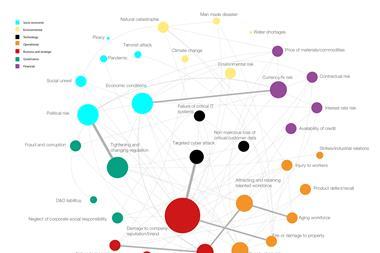By almost any standards, the last 12 months have been amongst the most turbulent in the history of the insurance industry. After such a year, we felt that there would be value in gathering and assessing the differing perspectives of a range of industry participants. Therefore we carried out a quantitative survey of risk managers at the end of 2005, supplemented by qualitative interviews with underwriters and brokers. What were our findings?
Perhaps surprisingly for an industry that has faced a series of catastrophic events, the survey reveals that the pace of business change remains disappointingly glacial. Issues that were on companies' agendas 10 years ago are still there, and still unresolved, for example: the lack of any serious technology initiatives, the failure to receive a policy on time, and the lack of transparency about who is being remunerated by whom, and for what.
There were some suggestions that the industry is embracing overdue change, however. The survey reveals a genuine will by insurers to deliver on the oft-made promise of contract certainty. It also highlights the fact that buyers want more choice and clarity in the services that they buy from brokers, and that they are prepared to be more forceful than in the past to achieve them. While the broker market is opening up for the first time in recent years, with new entrants offering new models of service, their presence has yet to make any real impact on buyers.
How certain is certainty?
The good news is that virtually everyone believes that, with sufficient focus, there is nothing really to stand in the way of the FSA's deadline for contract certainty being met. The general consensus among the risk managers and brokers interviewed is that the onus is firmly on the underwriters to get their processes and procedures right. Respondents ranked the issues that they thought might prevent contract certainty, where 10 was the most likely to cause problems, and 1 the least (see Table 1).
Underwriters were confident in their ability to deliver, and in fact the majority of those interviewed said that they were taking steps to take back much of the process from the brokers so that they can control it better. One example of this is that the Lloyd's businesses have grouped together to address the key issues and pool resources in order to benefit from economies of scale in terms of time and costs.
They also identified a number of areas which would help the industry to meet the deadline.
- Fewer lines on each slip make negotiation faster and easier. Nearly three quarters of risk manager respondents said they bought from fewer than 10 underwriters, and over half used fewer than six.
- The majority of contracts are very alike, so only the tiny minority really need bespoke attention.
- Slip policies and wordings are now used as proxies for the full slip. Since they both use references to standard clauses, and then spell out specific wordings, they can offer contract certainty at inception.
The vast majority of risk managers saw themselves as the victims of the lack of proper documentation. However, a few felt that they had perhaps not been active enough in helping the industry move forward. In some cases this was because the absence of a policy could occasionally be helpful in the case of a claim, but more felt that, as buyers, they should have been more forceful in voting with their chequebooks where parties had not delivered.
Very few felt that they should pay more to achieve contract certainty. "Why should I pay extra for delivery of the product?" was a common response.
The broker unbroken
Almost a year ago, the global commercial insurance market was rocked by the revelations of New York state attorney general Eliot Spitzer regarding broker remuneration. This was seen as the trigger for far-reaching change in how commercial insurance was bought and sold, and it was expected that every sector of the industry would be affected as a result. In fact, 12 months on there has been little change. Every buyer who responded to the survey said that not only did they put almost 100% of their business though a broker, but also that none of them expected this to change.
Every respondent was very clear that they rely on brokers to obtain adequately priced insurance coverage and to provide risk management consulting services, and that this reliance has not diminished. Interestingly, just under half of the risk managers who responded, handled their claims themselves (Fig 1). Two thirds said that this was because they thought it increased the efficiency of the process.
Underwriters believed that the broker provides a reach that would be expensive for them to replicate. However, many were starting to consider whether they should take back other parts of the value chain where they feel their reputations may be at risk, commonly quoted examples being policy issuance and claims handling.
New entrants
Following the well-publicised problems among the mega brokers at the end of last year, 2005 saw a number of new start ups in the wholesale brokers' market, as well as existing brokerages moving into the commercial space. In the US, Integro was launched, while in the UK, Oxygen led the new market trend.
All of the new entrants have recognised that the market has changed and that there is increasing pressure from clients, growing dissatisfaction with process inefficiency, a desire for greater transparency of commissions, and a need for more clarity on what is being provided and who is picking up the cost.
The good news for the new set-ups was that the majority of risk managers welcomed the idea of increased competition in the broker market. Many felt that the consolidation trend had gone too far, and that the choices available to them were too few.
Buyers were also very clear about the fact that insurance is a people business. While some might rail against the 'excessively club-like' nature of the London market, it is the people that they do business with, not the firm. One third of the risk managers felt that the length of time a company had been in business was not very important in their buying decision. The opinion of this group was that it was the individuals and their track record that were more important, though most agreed that corporate longevity did have a part to play.
The bad news was that the new entrants have failed to make their case loudly or clearly enough. Over half of the buyers who responded to the survey said that they did not know enough about the new entrants to form an opinion on whether their offering was attractive or not.
By being able to start with a clean sheet of paper, or more importantly with no paper at all, new brokers could use the best of modern technology. For example, Oxygen makes much of its use of a web-based customer portal through which an authorised customer can access risk information or monitor claims progress - information that traditional brokers often find time consuming to acquire.
It was also felt that there was an opportunity for the new entrants to help bring a greater transparency to the market, and indeed all the new entrants are very clear about their remuneration structures.
Broker reviews
Risk managers are, however, becoming much more interested in broker reviews, the survey showed. It was generally agreed that it was corporate best practice to conduct reviews of all suppliers at regular intervals, even if it is a time consuming process. The optimal review period was seen to be five years, but many risk managers did admit that, prior to their most recent review, periods of 8 to 10 years had been known to elapse. Just over two thirds of respondents have conducted a review of their brokers in the last two years (Figure 2).
Dissatisfaction with service levels and changes of personnel were cited as common reasons for initiating a review. A number of risk managers commented that, while getting the right price at renewal was important, it was how the ongoing service issues were handled throughout the year that really made a difference.
It is just a number
For the last year, the term 'transparency' has become the buzz-word of the insurance industry, as buyers' and regulators' attention has focused people's minds on getting a better grip on the whole issue of broker remuneration. Despite all the attention it has been given, remuneration remains a complex issue.
Buyers are very unclear about how much time it takes brokers to market and place their risk, and whether or not this time is reasonable.
Unfortunately, so are brokers. Senior management at broking houses admit that they have too often failed to differentiate between the activities they perform that add value, and those that are purely administrative. The gap left by the loss of substantial contingent commissions (Figure 3) was also highlighted by respondents.
There was also considerable commentary about the need for brokers to make absolutely clear who does what, and how much they get paid for it. The UK Association of Insurance and Risk Managers (AIRMIC) is also urging members to insist on transparency whenever purchasing insurance. Some brokers pointed out that, although buyers have long been able to require firms regulated under the terms of the Insurance Brokers (Registration) Act to disclose their earnings from insurers, in reality they rarely ask.
If past experience is any indication of future behaviour, it is unlikely that this 'annus horribilis' for insurance will result in any immediate, significant change. However, the survey shows that a combination of capital market focus and regulators' priorities are probably combining to put pressure on the market to change. Buyers too are starting to bring greater pressure to bear, and they may cease to be as tolerant of an industry that has only delivered on its promises intermittently.
Peter Allen is a partner in the financial markets group, Grant Thornton, Tel: 0870 991 2154, E-mail: peter.d.allen@gtuk.com A quantitative survey of FT-SE350 risk managers was carried out in late 2005 and supplemented by qualitative interviews amongst risk managers and brokers. A full copy of the report 'The corporate insurance buyer's perspective - The market in 2005' can be obtained by contacting Peter Allen.



















